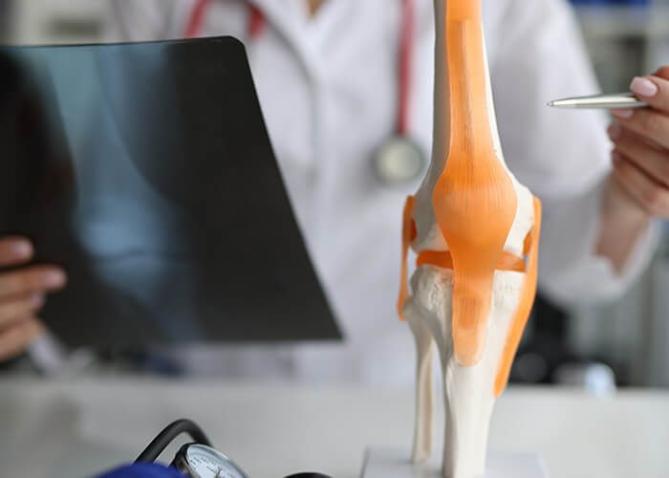Find a Doctor
Find rheumatologists near me
If this is a medical emergency, dial 911 immediately or visit one of IBJI’s OrthoAccess Immediate Care locations.

Why Should I See a Rheumatologist?
A rheumatologist can often help with any condition which causes painful muscles or joints. Our board-certified rheumatologists use the latest research and scientific knowledge to evaluate and treat conditions affecting bones, muscles, joints, and skin. We specialize in common disorders as well as rare or complex conditions. We take a highly individualized approach using an array of techniques to evaluate and treat your concerns.
See our FAQ section.
Among the conditions we treat are:
- Autoimmune diseases (i.e., lupus, mixed connective tissue disease, etc.)
- Arthritis, including osteoarthritis and inflammatory arthritis (i.e., rheumatoid arthritis, gout, psoriatic arthritis, ankylosing spondylitis, etc.)
- Osteoporosis
Rheumatology offers a comprehensive range of services for rheumatic and musculoskeletal disorders.
In addition to disease management, we offer convenient, on-site services such as infusion therapy, high-complexity labs, ultrasound-guided injections (cortisone and gel/hyaluronic acid injections), bone density scans (DXA), diagnostic ultrasound, CT, MRI, and physical and occupational therapy.
Common Conditions and Disorders
The best approach to recovery is early diagnosis and treatment. Rheumatologists at IBJI understand the complexities of rheumatic and autoimmune diseases. They will listen to your concerns and provide a thorough, comprehensive exam to diagnose your condition and customize a treatment plan according to your needs.
Conditions Treated by Rheumatology
- Ankylosing spondylitis
- Dermatomyositis/Polymyositis
- Fibromyalgia
- Gout/Pseudogout
- Joint pain (low back pain, knee pain, neck pain, hand pain)
- Lupus and autoimmune disorders
- Mixed connective tissue disease
- Osteoarthritis
- Osteoporosis/Osteopenia
- Polymyalgia rheumatica
- Psoriatic arthritis
- Rheumatoid arthritis
- Scleroderma
- Sjogren’s Syndrome
- Vasculitis
We treat hundreds of other autoimmune diseases. Please contact us to learn about the breadth of our services.
Rheumatology Treatments
IBJI’s board-certified rheumatologists provide a comprehensive treatment approach. We work with each individual patient to create an accurate diagnosis and treatment plan. This involves a detailed office visit and labs, which are conveniently located on-site. We can accurately diagnose your condition with the use of imaging, including X-rays, MRIs, and diagnostic ultrasound. We work with you to customize a treatment plan for your rheumatic disease in conjunction with physical therapy, occupational therapy, and nutritional counseling.
IBJI is proud to offer a premier bone health program designed for patients with osteoporosis/osteopenia that encompasses health and nutritional coaching and weight-bearing exercises. We have a bone density scanner (DXA) on-site for accurate diagnosis. In addition, we offer pharmacological treatment at our convenient and comfortable infusion center.
FAQs About Rheumatology Care
Why Would You See a Rheumatologist?
Any illness, syndrome, or disorder that causes pain in your joints, muscles, and soft tissues close to bones and joints can be treated by a rheumatologist. Also, our rheumatologists specialize in osteoporosis and metabolic bone disease. In fact, there are over 200 diseases in which rheumatologists specialize. The most common are:
- Ankylosing spondylitis
- Dermatomyositis/Polymyositis
- Fibromyalgia
- Gout/Pseudogout
- Joint pain (low back pain, Knee pain, neck pain, hand pain, etc.)
- Lupus and autoimmune disorders
- Mixed connective tissue disease
- Osteoarthritis
- Osteoporosis/Osteopenia
- Polymyalgia rheumatica
- Psoriatic arthritis
- Rheumatoid arthritis
- Scleroderma
- Sjogren’s Syndrome
- Vasculitis
Once they’ve diagnosed your specific disorder, your rheumatologist will design an all-encompassing treatment plan to minimize your pain.
Can Your Diet Help Your Rheumatoid Arthritis?
Studies show eating anti-inflammatory foods such as fruits, veggies, and cold-water fish (rich in omega-3 fatty acids), can reduce the inflammation experienced with inflammatory diseases. Avoiding processed foods can also help. Our nutritionists can guide you.
Can Rheumatoid Arthritis Go Into Remission?
It is possible. Our experts can guide you with a treatment plan. Clinical remission occurs when a person feels better and their symptoms are under control. Remission means your disease is no longer active and is typically the result of taking medication or other types of treatment.
When Should You See a Rheumatologist about Your Stiff, Painful, and Swollen Joints?
If you are experiencing stiff, painful and swollen joints, an IBJI rheumatologist can help you sort through the many possible causes and arrive at a personalized treatment plan. This could include lifestyle modifications, utilization of the newest medication therapies, and/or collaborating with other IBJI colleagues to address the root cause of your concerns. The understanding of rheumatic and autoimmune diseases is constantly evolving. Rheumatologists at IBJI have specialized training and certifications specific to these conditions and their symptoms. Our qualified rheumatologists can help minimize joint pain and improve mobility.
What Can You Do to Keep Your Rheumatoid Arthritis from Getting Worse?
Autoimmune diseases like rheumatoid arthritis (RA) cause your body to attack its bones, joints, and cartilage, which can cause high inflammation, joint swelling, and pain.
To manage your symptoms and have a good quality of life, we recommend:
- Regular physical activity
- Eating a nutritious diet
- Proper sleep
- Balancing activity with rest
- Addressing stress and anxiety
- Pharmacologic treatment as indicated for the specific condition offered via prescription and also at our on-site infusion center
How Is Osteoporosis Diagnosed?
A screening procedure called a bone density test (DXA) is used to diagnose this condition. We have DXA scanners on-site at several of our locations.
What Is Infusion Therapy?
Infusion therapies include IV medications administered to treat autoimmune disorders and osteoporosis to stop the progression of the disease. These medications target different disease pathways and block them at the cellular level. There is no cure for autoimmune diseases, but they are highly treatable. IV infusion therapy allows for a better quality of life.
At IBJI, our infusion therapy is done under the guidance of our board-certified rheumatologists and expert nurses. We offer an array of FDA-approved medications for multiple autoimmune diseases and osteoporosis to meet the needs of every patient. Our infusion center is conveniently located on-site. We manage all aspects of your infusion care including authorization and scheduling. We aim to create a process that is as seamless and stress-free as possible.
Resources
What is Trabecular Bone Score
Podcasts
Autoimmune Disease on IBJI's OrthoInform
Osteoporosis on IBJI's OrthoInform
Webinars
Healthy Bones and Osteoporosis with IBJI's Dr. Alejandra Rodriguez-Paez>>
Rheumatology, Autoimmune and Chronic Diseases with IBJI's Dr. Ami Kothari>>
Understanding Rheumatic Diseases with IBJI's Dr. Teresa Sosenko>>


